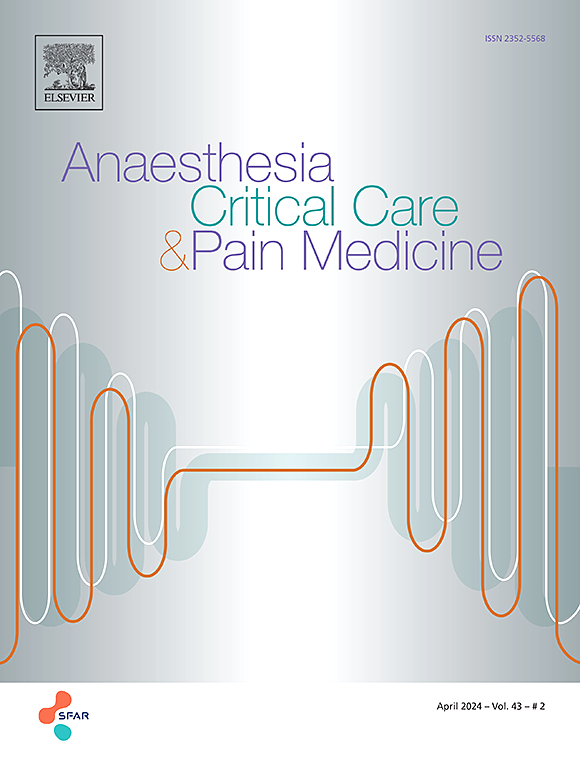Patients and relatives’ point of view on the choice of outcomes for a randomized-controlled trial in moderate-to-severe Traumatic Brain Injury
IF 4.7
3区 医学
Q1 ANESTHESIOLOGY
引用次数: 0
Abstract
Traumatic Brain Injury (TBI) is a major cause of mortality and disability worldwide. Clinical research is a cornerstone to improve patients’ outcomes. The empowerment of patients and relatives in research initiatives is now recommended to improve the relevance of trials. We performed an online survey in collaboration with the French National Association of Patients with Brain Injury (France Cérébrolésion) from November to December 2024, to understand their point of view regarding potential outcomes that could qualify hypertonic saline perfusion as relevant in the coming multicentric randomized-controlled COSMOS trial involving 760 moderate-to-severe TBI. 32 persons responded (19 (59.4%) relatives and 13 (40.6%) former patients). Using a 5-grade Likert scale, 23 (71.9%) responders rather agreed or entirely agreed that mortality was a relevant outcome; 26 (81.3%) rated activities of daily living as relevant; 27 (84.4%) rated cognitive function as relevant; 30 (93.7%) rated memory function as relevant; 17 (53.2%) rated functional outcome as relevant; 26 (81.3%) rated anxiety and depression symptoms as relevant; 27 (84.4%) rated quality of life as relevant. Ten (31.3%) responders could not understand the concept of functional outcome. The highest-ranked outcomes were mortality (16 responders gave the highest mark of 7), activities in daily living (14 responders), and memory (11 responders). Although this survey does not have the value of a consensus and further studies are needed to encompass other stakeholders’ opinions, we have modified the primary outcomes in COSMOS: functional outcome has been replaced by a hierarchy with 1/ survival and 2/activities in daily living.
患者和家属对中重度颅脑外伤随机对照试验结局选择的看法
外伤性脑损伤(TBI)是世界范围内导致死亡和残疾的主要原因。临床研究是改善患者预后的基石。现在建议在研究活动中赋予患者和亲属权力,以提高试验的相关性。我们于2024年11月至12月与法国国家脑损伤患者协会(France cc ())合作进行了一项在线调查,以了解他们对即将进行的多中心随机对照COSMOS试验的潜在结果的看法,该试验涉及760例中重度脑外伤。32人回应,其中亲属19人(59.4%),前患者13人(40.6%)。使用5级李克特量表,23名(71.9%)应答者相当同意或完全同意死亡率是相关的结局;26人(81.3%)认为日常生活活动是相关的;27例(84.4%)认为认知功能相关;30人(93.7%)认为记忆功能是相关的;17人(53.2%)认为功能结局相关;26人(81.3%)认为焦虑和抑郁症状相关;27人(84.4%)认为生活质量是相关的。10名(31.3%)应答者不能理解功能结局的概念。排名最高的结果是死亡率(16名应答者给出了最高的7分),日常生活活动(14名应答者)和记忆(11名应答者)。虽然这项调查不具有共识的价值,需要进一步的研究来包含其他利益相关者的意见,但我们已经修改了COSMOS的主要结果:功能结果已被1/生存和2/日常生活活动的层次结构所取代。
本文章由计算机程序翻译,如有差异,请以英文原文为准。
求助全文
约1分钟内获得全文
求助全文
来源期刊

Anaesthesia Critical Care & Pain Medicine
ANESTHESIOLOGY-
CiteScore
6.70
自引率
5.50%
发文量
150
审稿时长
18 days
期刊介绍:
Anaesthesia, Critical Care & Pain Medicine (formerly Annales Françaises d''Anesthésie et de Réanimation) publishes in English the highest quality original material, both scientific and clinical, on all aspects of anaesthesia, critical care & pain medicine.
 求助内容:
求助内容: 应助结果提醒方式:
应助结果提醒方式:


